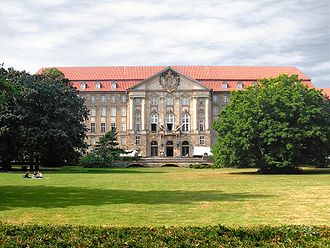
Following the Second World War, Germany was left without a functioning government. In order to ensure a peaceful Germany and secure their control over the country, the four major combatants in the European theater- the US, France, Russia, and the UK- formed the Allied Command Council on June 5th, 1945, to administer the various postwar measures including denazification of Germany, transfer of territory, and the arrest and trial of war criminals.
The Allied Control Council was formed on the same day that the Allies signed a treaty formally ending Nazi government. While the regime may have ended, pro-Nazi sentiment still existed within Germany. A central mission of the Council was to eradicate this sentiment. To this end, the Council removed officials from public office who were determined to be active Nazis, abolished the administrative unit of Prussia, and prohibited the dissemination of Nazi literature. The Council also charged war criminals, deported German-speaking minorities from non-German nations to Germany, and issued directives pertaining to the administration of occupied territory. Within the Council, Britain and the United States came to support the reunification of the occupation zones and the reestablishment of Germany. The Soviets were staunchly against this, and the French also initially refused to allow cooperation between their zone and the British and American ones for fear of Germany rising again. The Americans and British pushed ahead with the restoration of economic connections between their zones, eventually merging them into one zone, dubbed Bizone. The Soviet protested this, and following the introduction of the Deutschmark the Soviet representative walked out of a Council meeting on March 20th, 1948, ending Russian participation in the body. The Council would continue to engage in relatively minor operations like the running of Spandau Prison, but the running of Germany would be taken over by the East German and West German governments. On October 2nd, 1990, the Council held its last meeting in which it permitted German unification and for the West German government to take formal control over Berlin. Following this, the Council ceased to exist.
The Allied Occupation Council is an interesting institution. It is one of the few examples of an occupying authority set up jointly by victorious powers in war. That it was not meant to facilitate the annexation of Germany shows how much political norms had changed. That the US and Britain were willing to allow Germany to rebuild its government, its industry, and eventually its army shows just how powerful self-interest is as motivation. The western Allies quickly forgot their hatred of the Germans, as they had a new enemy to fight in the Soviet Union.